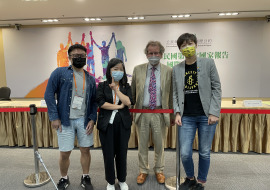國際公約
兩公約是什麼,兩公約施行法又是什麼,可以吃嗎?台灣政府在相關議題上是否符合以及司法系統有無確遵人權公約基準,特別是生命權、公平審判,乃至於其他人權規制,這些都是廢死聯盟持續關注的方向。
A breakthrough in human rights
2009-04-08 Taipei Times
By Peter Huang 黃文雄
On March 31, the legislature debated and ratified two international conventions. Such an event would be big news in more enlightened countries, but only one of Taiwan’s Chinese-language newspapers reported on it, and that report was rather short. In writing this article, I want to compensate for this puzzling omission.
The two conventions that the legislature approved are the International Covenant on Civil and Political Rights and the International Covenant on Economic, Social and Cultural Rights, which, together with the Universal Declaration of Human Rights, are the three most important global human rights agreements.
These UN conventions are regarded as parent laws on which the human rights practices of UN member states are largely based. As such, they are of great importance and have been signed by more than 150 countries to date. For each signatory state, putting international treaties and conventions into effect is in general a three-stage process. First, the treaty is signed by the country’s representative, then it is ratified by the legislature and signed into law by its head of state, and finally it is deposited into the custody of the UN Secretariat. Although Taiwan signed these two conventions in 1967, the rest of the process ran up against various obstacles and was not completed until now, 42 years later.
The first obstacle was the attitude of Taiwan’s former authoritarian government, which had deep misgivings about completing the ratification process. As with a number of other human rights-related conventions, the ink on the covenants was hardly dry before they got locked away in the Ministry of Foreign Affairs’ filing cabinet.
After Taiwan withdrew from the UN in 1971, the conventions were forgotten by the government and the public. Not until the 1990s were they unearthed by some civic groups, which started to push for their ratification. Although previous governments were asked to proceed with the ratification process, no results were seen in more than a decade, over which time there were three general elections.
Now the two human rights conventions have finally been approved by the legislature. There are several reasons to celebrate.
First, the ratification is a breakthrough from the previous situation, in which two successive administrations called for the conventions to be ratified but the legislature had reservations on three major clauses. Legislators also sought to modify the text regarding self-determination that features in both covenants to the effect that peoples should be able to “declare” this right rather than actually exercise it.
It should be noted that China’s legislature did not make such changes in wording when it ratified the International Covenant on Economic, Social and Cultural Rights. Now Taiwan’s lawmakers have ratified the conventions without reservation — undeniably a sign of progress.
Second, and more importantly, the legislature did not just approve the conventions, but also passed a law on their implementation, clearly ruling that they will have legal effect domestically whether they are deposited with the UN or not. The enforcement law gives priority to providing funds for implementation, and gives all levels of government two years in which to review their laws, regulations and practices and to amend or reform those that do not comply with the covenants. This sets a precedent for Taiwan’s ratification of and accession to other international conventions.
Third, the implementation law calls for the forming of a national human rights reporting system to regularly monitor the implementation of covenants. When this system gets off the ground, Taiwanese civic groups will be able to produce a counter-report, or shadow report, as do their counterparts in mature democracies, with which they can monitor the government’s performance.
Fourth, government policy should be implemented continuously and cumulatively. Work on the two conventions, which was initiated by the previous administration, is now being carried through by the current one. While the previous government instituted a trial implementation report on human rights, the reporting process will now be formal. This is a good example of how things should be done.
However, while celebrating these hard-won advances, there are some points that need further thought. In the authoritarian era, the government’s decision to sign international conventions had a great deal to do with international public relations for what it called “Free China.”
After Taiwan pulled out of the UN, however, the government found itself even more isolated from the international human rights framework. In such circumstances, the government was less informed about human rights matters than civic groups. Even the most basic work of compiling two volumes of international human rights law was achieved by the efforts of NGOs.
The new law on implementing the conventions assigns responsibility for reviewing and amending existing laws and practices to “government bodies at all levels.” It is not hard to predict how efficiently, or otherwise, they will carry out this task. The solution would be to establish a national human rights commission, such as the UN has been advocating for many years. Even China is working on setting one up.
Taiwan’s former administration submitted draft proposals to establish such a commission, but they were blocked in the legislature. In the coming week, the Taiwan People’s Alliance will hold a meeting to discuss an alternative draft for a human rights commission that has been drawn up by civic groups. Our present government, for its part, should also consider setting up an institution dedicated to human rights issues.
Human rights NGOs are working out how to monitor implementation of the two conventions. Would it be too much to ask the media to do what they are supposed to and report on this issue?
Peter Huang is chairman of Amnesty International Taiwan and a consultant to the Taiwan Association for Human Rights.
TRANSLATED BY JULIAN CLEGG



